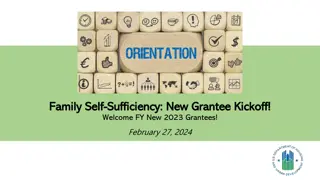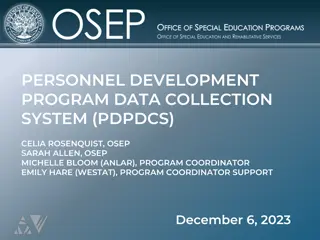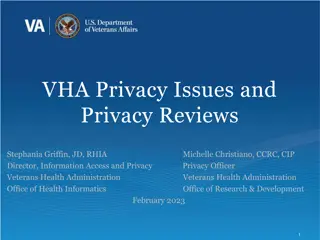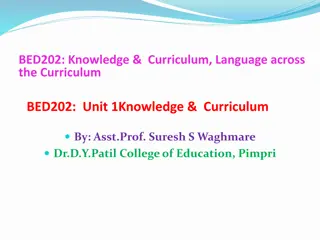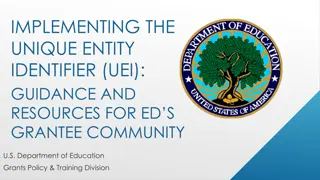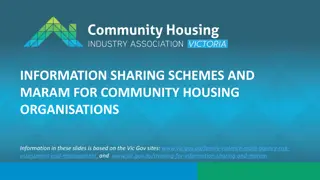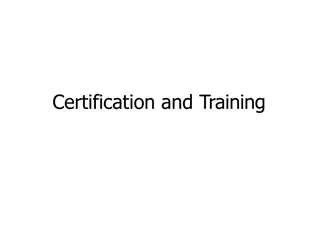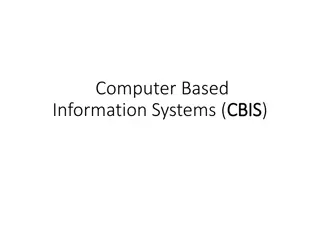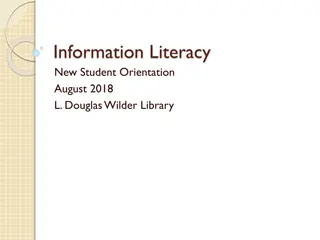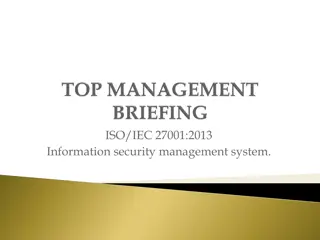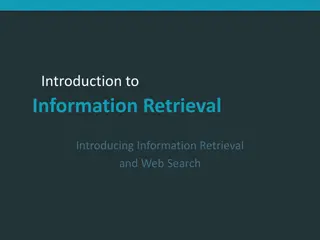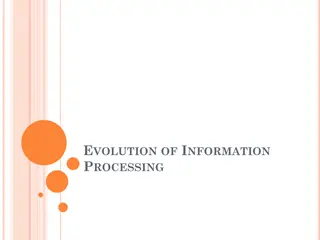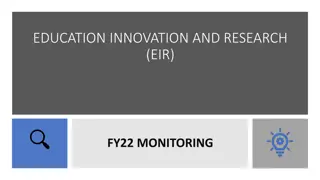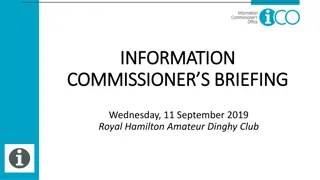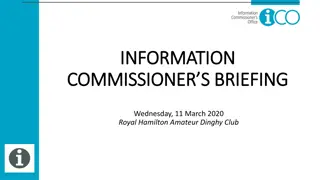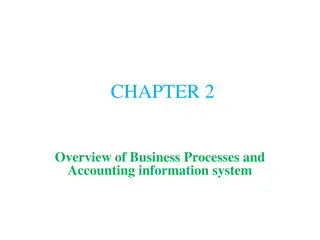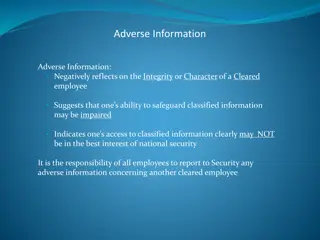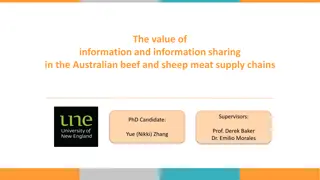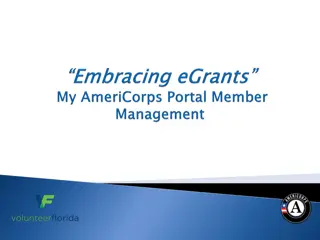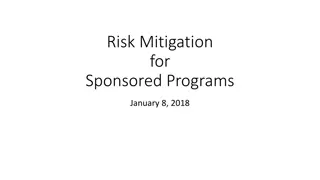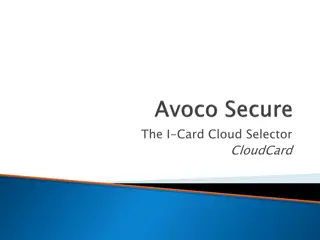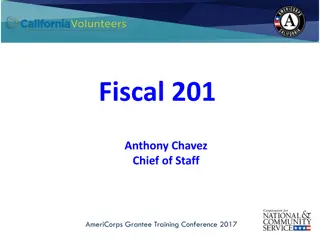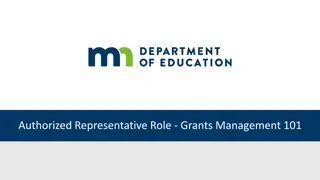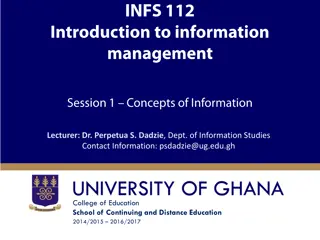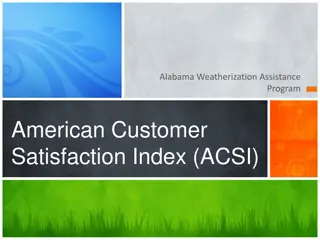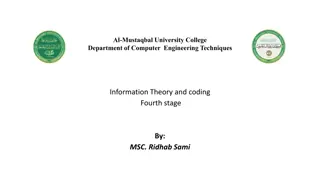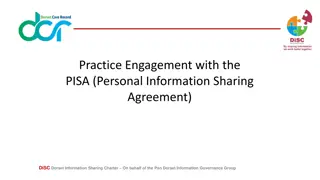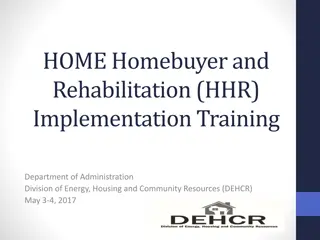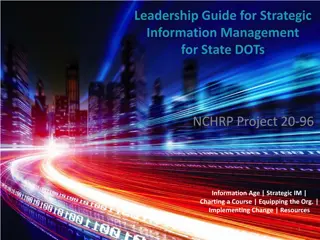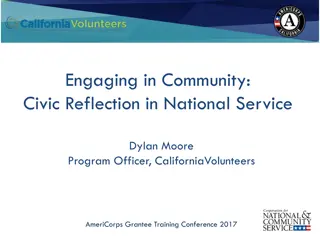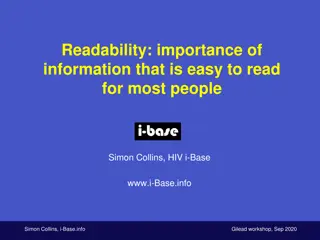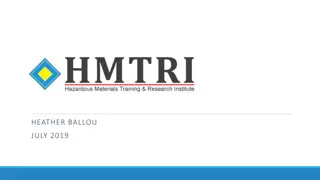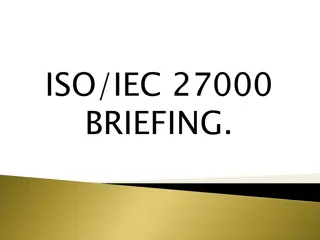Family Self-Sufficiency Program Overview & FY 2023 New Grantee Kickoff
The Family Self-Sufficiency Program (FSS) assists housing residents in increasing earnings and building financial assets through incentives and coaching. The kickoff for new grantees in FY 2023 welcomed participants and outlined the program's key features, goals, and financial details. Unique applic
3 views • 53 slides
Understanding Information Systems in Organizational Management
Management in organizations is divided into three levels: operational, tactical, and strategic. Each level requires different information systems to support various activities. Operational systems focus on routine transactions and control processes, while middle-level systems aid in semi-structured
9 views • 39 slides
Personnel Development Program Data Collection System Overview
The Personnel Development Program Data Collection System training aims to orient new grantees to data reporting requirements, improve data quality, and introduce the system. The training agenda includes grant priorities, reporting responsibilities, security strategies, and data submission processes.
1 views • 59 slides
Understanding VA Privacy Issues and Sensitive Information
Explore the complex landscape of VA privacy issues, including data relationships, sensitive personal information (SPI), personally identifiable information (PII), individually identifiable information (III), and individually identifiable health information (IIHI). Learn about the roles and responsib
0 views • 29 slides
Understanding Data, Information, Knowledge, and Curriculum in Education
Data is raw facts and figures, information is interpreted data with meaning, and knowledge is the accumulation of facts and information. The nature of knowledge involves acquiring information from real-life experiences and education. This content delves into the distinctions between data, informatio
0 views • 64 slides
Understanding the Notice of Award in Research Grants Management
The Notice of Award (NoA) is a crucial document in the grants management process that legally binds the grantee and establishes funding levels and conditions. It includes key information such as the grantee's details, principal investigator, funding period, and contact information. The NoA has stand
0 views • 49 slides
Implementing the Unique Entity Identifier (UEI): Guidance for ED's Grantee Community
Highlighting the transition from DUNS Number to UEI, this guidance resource provides background information, benefits of the UEI transition, key dates, necessary actions for grantees, and available resources to navigate the process effectively. Entities registered in SAM.gov have already received a
1 views • 14 slides
Understanding Information Centres: Types and Organization
Modern libraries are evolving into information centres, offering precise information to users. They bridge the gap between user needs and available information. Information centres play a crucial role in providing timely and relevant information, aiding in decision-making and preventing duplication
0 views • 28 slides
Information Sharing Schemes and MARAM for Community Housing Organizations
These slides provide insights on information sharing schemes and the MARAM framework designed for community housing organizations to promote the wellbeing and safety of children, assess family violence risks, and enhance collaboration across service sectors. The Child Information Sharing Scheme (CIS
2 views • 15 slides
Inter-Cluster Coordination and Information Management in Humanitarian Emergencies
Inter-Cluster Coordination and Information Management play vital roles in humanitarian emergencies. The coordination mechanism involves regular meetings convened by the RC/HC and coordinated by OCHA, providing opportunities for clusters to collaborate on shared planning, needs assessments, and poole
3 views • 13 slides
Certification and Training in Information Security
This content covers various aspects of certification and training in the field of information security, including organizational information security outlines, positions in information security personnel, and professional certifications from renowned organizations. It also provides insights into dif
0 views • 18 slides
Understanding Computer-Based Information Systems (CBIS)
Computer-Based Information Systems (CBIS) transform raw data into valuable information to support decision-making, coordination, and control. CBIS utilize computers to collect, process, analyze, and distribute information efficiently. Data is the raw material, while information is the processed data
0 views • 27 slides
Understanding Information Literacy: A Comprehensive Guide for Students
Information literacy is crucial for academic success. It involves the ability to recognize the need for information, locate relevant sources, evaluate their credibility, and effectively use the information for research and presentations. Primary and secondary sources play a vital role in gathering i
0 views • 19 slides
Understanding ISO/IEC 27001:2013 Information Security Management System
Overview of ISO/IEC 27001:2013 standard for information security management system (ISMS). Learn about the importance of protecting information assets, preserving confidentiality, integrity, and availability of information, and steps to certification. Enhance understanding of different types of info
0 views • 35 slides
Introduction to Information Retrieval and Web Search
Information Retrieval (IR) involves finding unstructured material, typically text documents, within large collections stored on computers to satisfy information needs. This process extends beyond web search to include email search, corporate knowledge bases, and legal information retrieval. The text
0 views • 53 slides
Evolution of Information Processing in Computerization
Evolution of information processing from raw data to useful information through computerization. Data is collected, processed, and converted into valuable insights for decision-making. The growth of complexity led to the development of Information Technology, enabling efficient creation, processing,
0 views • 7 slides
Education Innovation and Research (EIR) FY22 Monitoring Overview
The Education Innovation and Research (EIR) program focuses on establishing partnerships with grantees to allow flexibility in decision-making while ensuring excellence, accountability, and successful outcomes. Monitoring is essential for compliance, fraud prevention, and fiscal responsibility. The
5 views • 17 slides
Information Commissioner's Briefing at Royal Hamilton Amateur Dinghy Club
The Information Commissioner's Briefing held at Royal Hamilton Amateur Dinghy Club covered topics related to the Public Access to Information Act in Bermuda. The briefing emphasized the rights of Bermudians and residents to access public records, the role of the Information Commissioner in promoting
0 views • 51 slides
Information Commissioner's Role in Bermuda's Public Access to Information
The Information Commissioner in Bermuda plays a crucial role in promoting public access to information, ensuring compliance with the PATI Act, and safeguarding the right to access public information. This independent office provides guidance to public authorities, oversees enforcement activities, an
0 views • 37 slides
Understanding Business Processes and Accounting Information Systems
This chapter provides an overview of essential business activities, decisions, and information required for organizational operations. It discusses the role of the data processing cycle in organizing activities and supplying information to users. Various types of information needed for decision-maki
0 views • 62 slides
Understanding Adverse Information Reporting in National Security
This detailed content covers the importance of reporting adverse information regarding cleared employees in national security settings. It outlines the impact of adverse information on security clearances, the 13 adjudicative guidelines used in determining eligibility for sensitive duties, NISPOM re
0 views • 15 slides
Enhancing Information Sharing in Australian Meat Supply Chains
This research delves into the value of information and information sharing within the beef and sheep meat supply chains in Australia. It explores the benefits of improved decision-making, reduced costs, and enhanced supply chain performance through strategic information sharing. The study also ident
1 views • 21 slides
Process for Creating and Managing Service Opportunities in eGrants
Grantee recruiters and administrators can follow a step-by-step process to create, edit, and manage service opportunity listings in eGrants. The process involves tasks such as posting listings, accepting applications, extending offers, and completing enrollment forms. Key steps include accessing the
0 views • 49 slides
Mitigating Risks in Sponsored Programs - Audit Trends and Common Themes
The article discusses risk mitigation in sponsored programs, focusing on audit trends and common themes identified in recent NSF reports. The audits revealed questioned costs totaling over $860,000, highlighting issues such as travel costs, pre-award expenses, and inadequate documentation. Furthermo
0 views • 7 slides
Avoco's Cloud-Based Information Card Selector: Enhancing Usability and Security
Avoco's Cloud-Based Information Card Selector is a leap forward in Information Card usability, offering benefits such as universal access to Information Cards, zero footprint for end users, and enhanced security features. The platform allows for easy creation, import, and backup of cards, as well as
0 views • 29 slides
AmeriCorps California Volunteers Fiscal Training Conference 2017 Details
In July 2017, the AmeriCorps Grantee Training Conference took place, focusing on fiscal procedures, compliance, desk reviews, and monitoring. The conference covered topics such as improper payments elimination, common audit findings, and the fiscal desk review process implemented by California Volun
2 views • 22 slides
Understanding the Role of Authorized Representatives in Grants Management
Authorized Representatives (AR) play a crucial role in managing grants by overseeing program compliance, decision-making, budget approvals, and reporting requirements. They ensure funds are used appropriately, monitor grantee progress, and implement state and federal regulations to meet program goal
0 views • 28 slides
Understanding Data, Information, and Knowledge in Information Studies
Data, information, and knowledge play vital roles in our lives and are essential in information studies. Dr. Perpetua Dadzie explores the definitions and distinctions among data, information, and knowledge, emphasizing the transformation process that turns raw data into meaningful information. The s
0 views • 23 slides
Alabama Weatherization Assistance Program: Customer Satisfaction Highlights
The Alabama Weatherization Assistance Program's American Customer Satisfaction Index (ACSI) results highlight a Customer Satisfaction Index of 83, surpassing the DOE WAP National Customer Satisfaction Index of 67. The program's strengths in communication and technical assistance are evident, but are
0 views • 14 slides
Understanding the Role of Classified Information in Criminal Trials
In criminal trials, the handling of classified information is crucial and governed by specific rules. Defendants do not have an inherent right to access classified information, and there are procedures in place to determine its use in court. The rights surrounding secret evidence include protection
0 views • 43 slides
Understanding Information Entropy in Information Theory
Information entropy, a key concept in information theory, measures the average amount of information in a message. Source entropy and binary source entropy are explained with examples, along with maximum source entropy for both binary and non-binary sources. Learn how to calculate entropy for differ
0 views • 12 slides
Enhancing Information Sharing: DISC and PISA Benefits
DISC (Dorset Information Sharing Charter) and PISA (Personal Information Sharing Agreement) facilitate improved information sharing among healthcare organizations in Dorset. DISC establishes robust principles for managing data flow and promoting best practices in information governance, while PISA t
0 views • 8 slides
HOME Homebuyer and Rehabilitation (HHR) Program Overview
Providing an insight into the HOME Homebuyer and Rehabilitation (HHR) program, this training session covers various aspects including program requirements, funding details, grantee information, annual contracts update, and HHR activities for single-family homes and other housing units.
0 views • 74 slides
Leadership Guide for Strategic Information Management in State DOTs
This guide provides insights into maximizing the value of available information, enhancing efficiency in information collection and use, and improving organizational readiness. It addresses the evolving role of transportation agencies as facilitators of information and the significance of informatio
0 views • 27 slides
Exploring Civic Reflection in National Service - AmeriCorps Grantee Training Conference
Engage in Civic Reflection at the AmeriCorps Grantee Training Conference to deepen discussions about civic life. Learn the value of reflective discussions, develop learning objectives, and explore the impact of names on identity and interaction. Understand the defining characteristics of Civic Refle
0 views • 10 slides
Importance of Readable Patient Information in Healthcare
Patient information plays a crucial role in healthcare, but the readability of this information is often overlooked. Simon Collins discusses how difficult text can create barriers to accessing healthcare and the importance of making patient information easy to understand. The talk emphasizes the nee
0 views • 37 slides
Community Job Training Programs and Professional Learning Resources
Capacity builders support communities in creating successful job training programs through online resources, a professional learning community, all-grantee meetings, webinars, newsletters, and more. The HMTRI MentorLink Program and the Rural Alaska Community Environmental Job Training Program are hi
0 views • 10 slides
Selling Information to Budget-Constrained Buyers
The images and descriptions discuss the concept of selling information through consulting, focusing on marketing, consumer information, and credit reports. Motivations for targeting budget-constrained buyers and the optimal mechanisms for selling information are explored. The content highlights mode
0 views • 26 slides
Dr. Pieter Van Cleynenbreugel's Journey as an ERC Starting Grantee
Dr. Pieter Van Cleynenbreugel, an ERC Starting Grantee from the EUDAIMONIA call in 2020, shares insights on his experiences as an applicant and grantee. From his law studies to the decision-making process for his ERC project, this narrative unveils his journey towards scientific curiosity and ground
0 views • 8 slides
Importance of Information Protection and Security Measures
Enhance understanding of information and information security, different types of information assets, classification of internal and confidential information, types of data, information life cycle, and potential risks if information is not well-protected.
0 views • 25 slides
